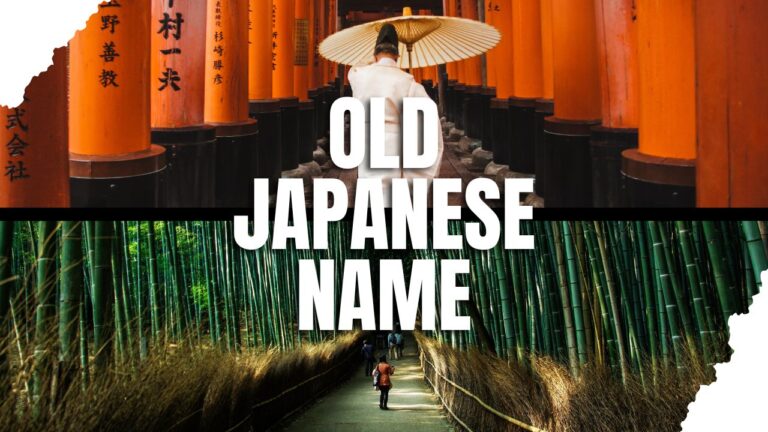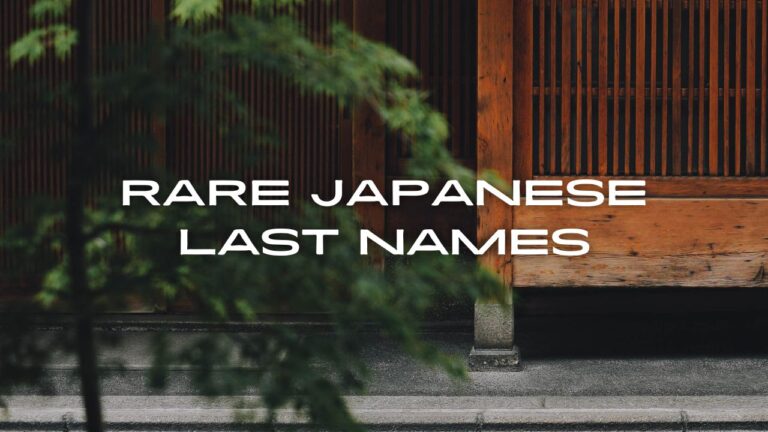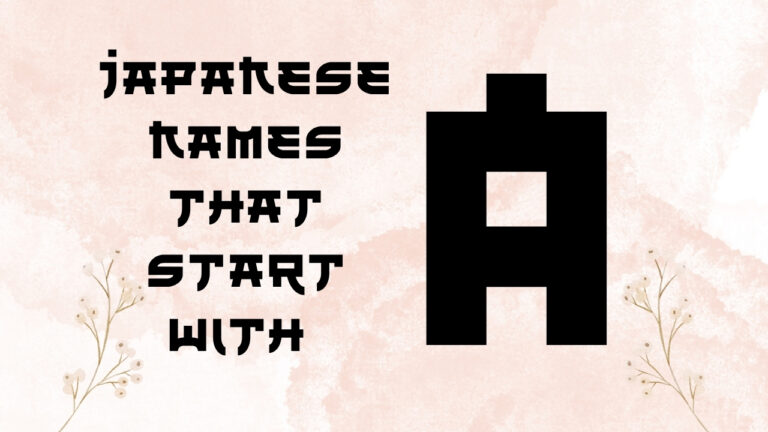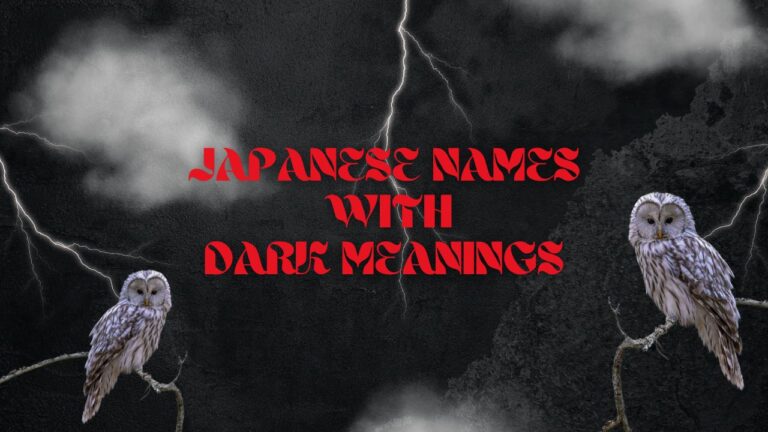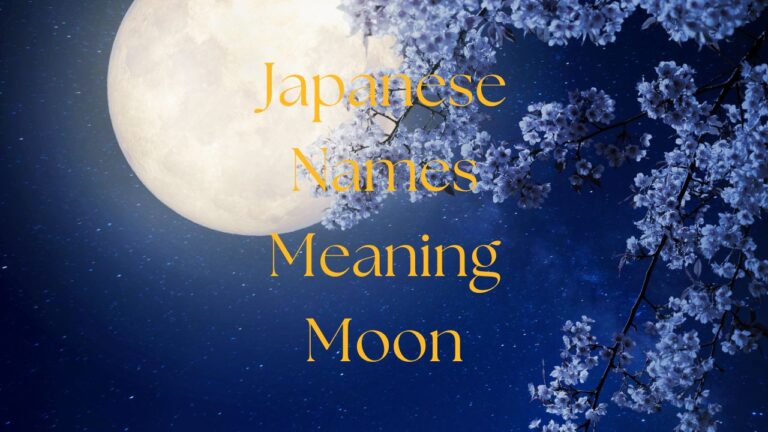130+ Japanese Names for Snow – Spiritual & Historical Meanings
Snow holds a deep and poetic place in Japanese culture, often inspiring beautiful and meaningful names. Whether it’s a gentle snowfall or a powerful winter storm, the imagery of snow appears in many traditional and modern names.
This guide explores a variety of Japanese names for snow girl, snow boy, and snow unisex choices that reflect the purity, elegance, and quiet strength of winter. You’ll also discover Japanese names for snow historical in nature, rooted in ancient traditions and stories.
Each name tells a story, making it perfect for those who appreciate both nature and meaning in a name.
Also Read:Japanese Names Meaning Moon – 100+ Lunar-Inspired Names
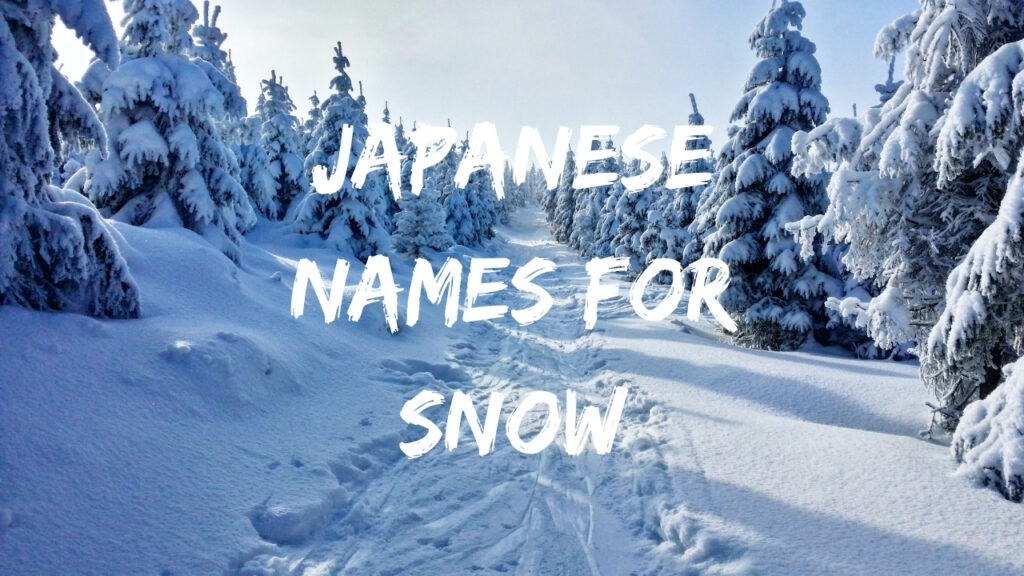
unisex Japanese names for snow
- Yuki (雪) – “Snow”
A simple and pure name that directly means snow. Widely used across genders. - Setsu (雪 / 節) – “Snow” or “Season”
Can represent snow or a seasonal transition, elegant and gender-neutral. - Fuyuki (冬雪) – “Winter Snow”
A poetic name combining winter (fuyu) and snow (yuki), soft and serene. - Miyuki (美雪) – “Beautiful Snow”
Traditionally feminine but used unisex, known for its graceful tone. - Shirayuki (白雪) – “White Snow”
Often linked with purity and fairy tale imagery like Snow White (Shirayuki-hime). - Hatsuyuki (初雪) – “First Snow”
Symbolizes a fresh start or beginning, and is widely appreciated in literature. - Koyuki (小雪) – “Light Snow”
Refers to a gentle snowfall, expressing subtlety and calmness. - Yukine (雪音) – “Sound of Snow”
A poetic name often linked to stillness or the quiet sound during snowfall. - Yukito (雪翔) – “Snow Flight”
Combines snow with flight or soaring, giving a free-spirited feel. - Yukinari (雪成) – “Snow Becomes”
Symbolizes transformation or peaceful growth under the snow. - Yukiharu (雪晴) – “Clear Snowy Weather”
Represents clarity after snow, balance between cold and warmth. - Yukisora (雪空) – “Snowy Sky”
A unique name capturing the image of a sky full of snowflakes. - Yukiya (雪弥) – “Snow Harmony”
Used for both boys and girls, evokes peace and natural beauty. - Yukihiko (雪彦) – “Snow Lad”
Although traditionally more masculine, now used gender-neutrally in modern naming. - Fuyusora (冬空) – “Winter Sky”
Suggests a vast, calm sky during the coldest season—unisex and serene. - Yukika (雪華) – “Snow Blossom”
A poetic blend of snow and flower imagery, elegant and unique. - Yukishiro (雪白) – “Snow White”
Means the whiteness of snow, implying innocence and simplicity. - Yukikaze (雪風) – “Snow Wind”
Used in literature and anime, symbolizing strong winter breezes. - Yukitoha (雪葉) – “Snow Leaf”
A rare, modern name blending nature and season into one calm name. - Yukizora (雪空) – “Snow Sky”
Peaceful and ethereal, used in creative works and art-based names. - Fuyukiho (冬希歩) – “Winter Hope Steps”
A unique combination name suggesting walking forward with hope through winter. - Yukikaoru (雪薫) – “Fragrance of Snow”
Very rare and poetic; evokes the quiet, imagined scent of fresh snow. - Yukimi (雪見) – “Snow Viewing”
Often linked to peaceful winter scenes, like viewing cherry blossoms in spring. - Yukinagi (雪凪) – “Snow Calm”
A serene name that combines snow with calm winds or silence. - Yukihana (雪花) – “Snow Flower”
Soft and elegant, used across genders with gentle natural beauty.
Japanese boy names for snow
- Yukimaru (雪丸) – “Snow Circle / Boy”
A strong and historical name, often used in samurai tales. - Yukitaka (雪隆) – “Snow, Noble / Elevated”
Represents a noble or dignified presence like majestic winter. - Fuyukiya (冬希也) – “Winter, Hope, Also”
Symbolizes a hopeful boy born in winter, rare and thoughtful. - Yukihide (雪英) – “Snow, Excellence”
Blends the purity of snow with strength or brilliance. - Yukimasa (雪正) – “Snow, Justice / Right”
A name representing fairness and clear character. - Fuyuhiko (冬彦) – “Winter Lad”
A traditional yet bold name, gives off a classic winter-born vibe. - Yukisada (雪貞) – “Snow, Chastity / Loyalty”
Symbolic of honor and quiet inner strength. - Fuyukiatsu (冬暖) – “Winter Warmth”
Represents someone who brings warmth in the cold, a comforting presence. - Yukitsune (雪恒) – “Snow, Constant”
Evokes dependability and peace, like consistent snowfall. - Yukinobu (雪信) – “Snow, Trust / Faith”
Reflects someone who is trustworthy and calm as snow. - Fuyuma (冬真) – “Winter, Truth”
A boy’s name meaning genuine or truthful winter. - Yukisadao (雪貞夫) – “Snow, Loyal Man”
An older-style name symbolizing masculine values and honor. - Yukiharuya (雪春也) – “Snow, Spring, Also”
Unusual blend of snow and spring, suggesting balance and transition. - Fuyumaoki (冬真興) – “True Winter Rising”
Complex and powerful name, ideal for someone who stands out. - Yukishige (雪重) – “Snow, Serious / Weight”
Implies depth and emotional weight like heavy snowfall. - Fuyusada (冬貞) – “Winter, Loyalty”
Simple and deeply rooted in traditional virtues. - Yukikatsu (雪勝) – “Snow, Victory”
A name for a boy with a winning, enduring spirit. - Yukinobuya (雪信也) – “Snow, Trust, Also”
Unique modern-traditional fusion name, calm and composed. - Fuyuhide (冬秀) – “Winter, Excellence”
Represents someone who shines in the cold—resilient and capable. - Yukioji (雪王司) – “Snow, King, Govern”
Suggests leadership and strength cloaked in winter’s stillness. - Fuyukatsu (冬勝) – “Winter, Victory”
Similar to Yukikatsu but more seasonal-specific, assertive and rare. - Yukihaya (雪速) – “Snow, Swift”
A modern and brisk name representing swift snowfall or agility. - Yukihisa (雪久) – “Snow, Eternal / Long-lasting”
Speaks of longevity and stable character like eternal snow. - Fuyumaoru (冬真織) – “True Winter Weave”
Poetic and rare, refers to weaving truth through cold times. - Yukishun (雪俊) – “Snow, Talented / Smart”
Represents intelligence and grace combined with winter calm.
Japanese girl names for snow
- Yukikae (雪替) – “Change of Snow”
Symbolizes transition or the arrival of snow, often poetic and rare. - Fuyuka (冬佳) – “Beautiful Winter”
Simple and elegant, reflects someone born in or loved during winter. - Yukimiya (雪宮) – “Snow Shrine / Palace”
Evokes peaceful, sacred winter imagery; refined and feminine. - Fuyuri (冬里) – “Winter Village”
Rustic and calm, like a quiet village in snow, rare in usage. - Yukihanae (雪花恵) – “Snow Flower Blessing”
Represents the blessings of nature and beauty in wintertime. - Yukiyume (雪夢) – “Snow Dream”
A soft, dreamy name, used for its poetic and gentle sound. - Fuyumi (冬美) – “Winter Beauty”
Classic feminine name symbolizing grace during the cold season. - Yukie (雪江) – “Snow Inlet / Bay”
A traditional name, serene and connected with calm snowy shores. - Yukikaori (雪香) – “Snow Fragrance”
Evokes a delicate, imagined scent of fresh snow, gentle and unique. - Fuyuna (冬奈) – “Winter Nurture”
Modern-sounding with nurturing warmth despite the cold season. - Yukisaki (雪咲) – “Snow Blossom”
Different from Yukika, this refers more directly to blooming in snow. - Yukinami (雪波) – “Snow Waves”
Rare and poetic; suggests gentle motion like falling snowflakes. - Fuyuzora (冬空) – “Winter Sky”
Peaceful and feminine version of the seasonal name for calm skies. - Yukikinu (雪絹) – “Snow Silk”
Silky and smooth like soft snow, elegant in both sound and imagery. - Fuyuno (冬乃) – “Belonging to Winter”
A sweet, classic-sounding girl’s name with seasonal attachment. - Yukiori (雪織) – “Snow Weave”
Symbolizes artistic expression, delicacy, and quiet beauty. - Fuyukaori (冬香) – “Winter Fragrance”
Represents softness, peace, and beauty that comes during cold months. - Yukise (雪瀬) – “Snow Rapids / Stream”
A beautiful contrast between snow and motion, calm yet powerful. - Fuyukaede (冬楓) – “Winter Maple”
Nature-based name linking snowy winters with the grace of maple trees. - Yukitama (雪珠) – “Snow Jewel”
Suggests purity and preciousness, gentle yet strong. - Fuyuko (冬子) – “Child of Winter”
A traditional name still used today, deeply tied to seasonality. - Yukinae (雪苗) – “Snow Sprout”
Evokes hope and growth beneath the snow, quiet determination. - Fuyuhana (冬華) – “Winter Flower”
Represents a rare bloom during the cold season—strong and graceful. - Yukieko (雪栄子) – “Snow Glory Child”
Old-fashioned yet noble, combining beauty and honor. - Fuyuyuri (冬百合) – “Winter Lily”
A graceful floral name associated with purity and resilience.
unique Japanese names for snow
- Yukizuki (雪月) – “Snow and Moon”
A deeply poetic name symbolizing serenity and seasonal beauty. - Fuyukaze (冬風) – “Winter Wind”
Captures the chill yet gentle breeze of the winter season. - Yukitsuki (雪槻) – “Snow and Zelkova Tree”
Nature-inspired and symbolic of calm, strength, and snow. - Fuyushimo (冬霜) – “Winter Frost”
Represents quiet, icy stillness and rare morning frost. - Yukimori (雪森) – “Snow Forest”
Evokes the imagery of a forest blanketed in snow—calm and vast. - Yukishimo (雪霜) – “Snow Frost”
Refers to the layered texture of coldness and beauty. - Shirafuyu (白冬) – “White Winter”
Represents purity and the full essence of a snowy season. - Fuyuhikari (冬光) – “Winter Light”
Suggests soft light shining through snow or clouds. - Yukiarashi (雪嵐) – “Snowstorm”
A rare, powerful name that captures wild beauty and strength. - Yukihane (雪羽) – “Snow Feather”
Soft and delicate like a snowflake, with light imagery. - Fuyuhoshi (冬星) – “Winter Star”
A celestial name blending snow season with starlight. - Yukiba (雪場) – “Snowfield”
Calm, wide, and connected to nature—ideal for poetic usage. - Fuyunagi (冬凪) – “Winter Calm”
A serene name reflecting stillness and gentle seasonal quiet. - Yukigumo (雪雲) – “Snow Cloud”
Describes the thick, heavy clouds before a snowfall. - Yukineko (雪猫) – “Snow Cat”
Rare, modern name possibly inspired by pets or literature. - Fuyunoha (冬の葉) – “Leaf of Winter”
Symbolizes quiet beauty and hidden growth during the cold. - Yukikusa (雪草) – “Snow Grass”
Suggests fragile growth and strength beneath snow cover. - Yukikami (雪神) – “Snow Spirit / God”
A spiritual or mythical name tied to Japanese folklore. - Fuyukiri (冬霧) – “Winter Mist”
Dreamy and mysterious name suggesting a foggy, cold morning. - Yukiyuki (雪行) – “Snow Journey”
Represents life’s passage through hardship and purity. - Shiratsuyu (白露) – “White Dew”
Delicate morning dew in winter, often used in haiku. - Yukigami (雪髪) – “Snow Hair”
Rare and stylized—used in literature or fantasy settings. - Fuyutake (冬竹) – “Winter Bamboo”
Represents quiet strength and endurance, bamboo standing in snow. - Yukijin (雪陣) – “Snow Battlefront”
Used in fantasy or dramatic storytelling, intense and vivid. - Yukihanaoto (雪花音) – “Sound of Snow Blossoms”
A creative, modern poetic name with layered sensory imagery.
historical Japanese names for snow
- Yukinaga (雪長) – “Snow, Eternity”
Used in historical records, symbolizes long-lasting purity or endurance. - Fuyunoshin (冬之進) – “Winter, Devoted One”
A name style used in the samurai era, combining loyalty and season. - Yukichika (雪親 / 雪近) – “Snow, Intimacy / Nearness”
Appeared in aristocratic circles and poetic texts. - Fuyunoshō (冬之庄) – “Estate of Winter”
An old-style name often linked to land-owning or regional clans. - Yukikage (雪景) – “Snow Scene”
Found in Edo-period poems and old painting titles as a noble given name. - Fuyuyasu (冬康) – “Winter, Peace”
A masculine name found in feudal registries, often samurai-born. - Yukihisa (雪尚) – “Snow, Esteem”
Used in noble naming lines to express respect and refinement. - Fuyuyuki (冬雪) – “Winter Snow”
While modern-sounding, this compound appears in ancient waka poetry. - Yukikura (雪蔵) – “Snow Storage / Storehouse”
Historically symbolic of preserved purity or treasures hidden in winter. - Fuyumoto (冬元) – “Origin of Winter”
Used in early naming records from Heian and Kamakura periods. - Yukinobu (雪信) – “Snow, Trust”
A classic name found in medieval Japanese scrolls and warrior families. - Fuyunari (冬成) – “Winter Achievement”
Represents success or outcome during harsh seasonal challenges. - Yukitada (雪忠) – “Snow, Loyalty”
Common in loyal retainers’ names during Sengoku period. - Fuyuhide (冬秀) – “Winter, Excellence”
Used by high-ranking officials and scholars in the Edo period. - Yukimaru (雪丸) – “Snow Boy / Circle”
Historically used in folklore and ancient tales (e.g., Soga Brothers). - Fuyuyori (冬頼) – “Winter, Reliance”
A name of regional leaders noted in feudal Japanese texts. - Yukifusa (雪房) – “Snow Hall / Chamber”
Nobility-based name linked to scholarly or religious houses. - Fuyuzane (冬実) – “Winter, Reality / Truth”
Historical warrior or monk name indicating grounded nature. - Yukimitsu (雪光 / 雪満) – “Snow Light / Snow Abundance”
Appears in Noh plays and ancient weapon inscriptions. - Fuyukage (冬影) – “Winter Shadow”
Poetic name used in calligraphy, kabuki, and noble houses. - Yukikuni (雪国) – “Snow Country”
Refers to northern provinces like Echigo; appears in ancient registries. - Fuyutaka (冬貴) – “Winter, Noble”
Name style often used by scholarly aristocrats. - Yukiharu (雪晴) – “Snow, Clear Skies”
Cited in seasonal poetry and ancient court names. - Fuyusada (冬定) – “Winter, Steadiness”
Appeared in old shrine records and as an imperial retainer name. - Yukinao (雪直) – “Snow, Honesty / Integrity”
A warrior’s name known for righteousness and clarity.
spiritual Japanese names for snow
- Yukikami (雪神) – “Snow Spirit / Deity”
Evokes the divine force of snow, sometimes used in folklore or shrine references. - Shirayami (白闇) – “White Darkness”
Spiritually poetic; represents the quiet void created by snowfall. - Fuyurei (冬霊) – “Winter Spirit”
A mystical name evoking ancestral or seasonal spirits in winter. - Yukihō (雪法) – “Snow Dharma / Law”
Symbolizes purity in spiritual practice, used in Buddhist context. - Shimozen (霜禅) – “Frost Zen”
Represents stillness and meditation in the cold—deeply Zen-inspired. - Yukikōmyō (雪光明) – “Snow Light of Wisdom”
Combines snow with sacred light; used symbolically in temples. - Fuyumai (冬舞) – “Winter Dance”
A name connected to spiritual Noh or Kagura dances in shrines. - Yukisō (雪想) – “Snow Thought / Meditation”
Implies contemplative silence, as in the practice of winter solitude. - Yukisen (雪禅) – “Snow Zen”
Minimalist and spiritual—reflects calm mind and snow-filled silence. - Shiroshinjitsu (白真実) – “White Truth”
Symbolizes spiritual awakening through natural purity. - Fuyukon (冬魂) – “Winter Soul”
Speaks of a quiet, enduring spirit formed during the cold season. - Yukimei (雪命) – “Snow Life / Destiny”
A rare name reflecting fragile yet meaningful existence. - Yukizui (雪髄) – “Snow Essence”
Mystical, referencing the core spirit or marrow of winter purity. - Shirayukiya (白雪夜) – “White Snow Night”
Symbolic of silent nights with spiritual reflection. - Yukikōrin (雪光輪) – “Snow Halo / Radiant Ring”
Evokes Buddhist imagery of enlightenment surrounded by still snow. - Fuyuhitomi (冬瞳) – “Winter Eye / Vision”
Represents spiritual insight gained in times of stillness. - Yukinaoto (雪直人) – “Snow Honest Soul”
Reflects inner purity and a path of spiritual integrity. - Shimoensō (霜円相) – “Frost Enso (Zen Circle)”
Represents a spiritual circle of completeness, drawn with mindfulness. - Yukishin (雪心) – “Snow Heart”
A deeply symbolic name for compassion, calm, and spiritual purity. - Fuyukagami (冬鏡) – “Winter Mirror”
Suggests spiritual reflection like looking into a snow-covered surface. - Yukichirashi (雪散らし) – “Snow Scattering”
Symbolic of impermanence in Buddhist thought—transience of beauty. - Yukiyamato (雪大和) – “Snow and Yamato Spirit”
References the traditional spiritual soul of Japan, pure and resilient. - Shirakokoro (白心) – “White Heart / Pure Heart”
Spiritual name signifying innocence, clarity, and empathy. - Yukiren (雪蓮) – “Snow Lotus”
Rare and symbolic—combines the purity of snow with enlightenment of the lotus. - Fuyuyugen (冬幽玄) – “Winter Mystery / Subtle Elegance”
Refers to the concept of yūgen—a profound, mysterious beauty tied to spirit and nature.
Conclusion
Japanese names inspired by snow beautifully capture the quiet elegance, strength, and spiritual depth associated with winter. Whether drawn from nature, history, or deeper symbolism, these names offer more than just seasonal charm—they reflect timeless values like purity, resilience, and tranquility.
From poetic to powerful, each name carries its own story, making it a meaningful choice for anyone seeking a name with depth and cultural richness.

